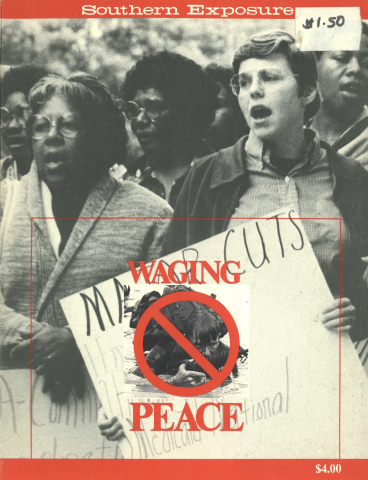My Life as a Cult Member

This article originally appeared in Southern Exposure Vol. 10 No. 6, "Waging Peace." Find more from that issue here.
The recent attention given to the various cults at large in America has prompted me to do some soul-searching. In the interest of truth, I feel compelled to admit to my readers a part of my personal history that I have kept hidden for the past nine years: I was once an active member of a cult.
First let me appeal to your compassion. As a confused and directionless teenager roaming the streets of a Northern ghetto in 1967, I was easy prey for the cult's manipulative spokesmen. Looking back on my life I now realize what a perfect mark I was for their smooth and effective line. Without a job or future prospects I easily slipped into the cult's grip as their spokesmen pointed out the emptiness of my young existence. Come with us, they urged, and become a part of a new and vibrant society. Broke, uneducated, with no clear idea of what to do with my untapped energies, I fell under the sway of the cult. I became one of Them.
Immediately the face of the cult changed. In the place of the spokesmen's original promises to provide a life of mutual respect and good fellowship, I was subjected to the most base and vulgar humiliations. After whisking me to a remote rural location, cult leaders made their plan clear: they would destroy my former personality and attitudes, replacing the old me with a new and more malleable version, one worthy of serving the leader. But first, I must be reduced to a groveling mass of flesh, unworthy of even self-respect. Only after they had destroyed my previous values and standards of conduct would the cult's senior members attempt to instill in me their own set of ideals.
Their methods were classic techniques of brainwashing. They shaved my head — the first stage in taking away my individuality. I was verbally and physically harassed, day and night, sometimes deprived of sleep for more than 24 hours at a time. Driven to the point of exhaustion and derided with every conceivable insult, my old world collapsed into a small space somewhere inside my head. The cult dominated my every action and soon influenced all my thoughts. Beaten psychologically, it took only a few weeks for me to abandon resistance and yearn instead for acceptance within the cult, for some sign of praise.
I no longer thought of escape; from the very beginning, the cult spokesmen had warned me that any attempt to leave the rural communal programming site would be futile. The cult's servants were everywhere, they said, and I would surely be found and punished if I fled. Finally, confident that my initial stage of rebellion was past, the cult allowed me to go into the outside world for brief periods. Their confidence was rewarded, as I told my former friends and acquaintances what good things the cult was doing, how I had benefited from my life with them and was changing into a better person.
Soon I was being rewarded with small favors and privileges, better food and living conditions, higher status, and, most importantly, the right to engage in the process of programming newer members of the cult with the age-old enthusiasm of all converts, so much so that the elders sometimes cautioned me against undue fervor. Especially exciting to me was the opportunity to lead the death drills, in which all members of the cult proved their allegiance to the leader and the cause by risking life and limb in dangerous exploits. In the cult, disregard for personal safety is a virtue of the highest order.
It was not long before I enjoyed status within the cult usually reserved for much older members, and as the years went by I found the elders were once again speaking to me in the tones of caring and comradeship that they had used while wooing me into the cult. I was nearing the time when, traditionally, cult members would be allowed to choose their own paths — to stay within the order or leave. Outside the cult, said the elders, lay the evils of an unpredictable and unfeeling world. Inside was the lifelong promise of security, devoid of the confusion of free will.
I left and never turned back, although the prospect of coping with life unaided by the supporting structures of the cult was frightening. So, as I read of the Jonesies, Moonies and Synanites, it is difficult for me to assume the conventional posture of self-righteousness and contempt. For I, too, was a cult member for three years, until I took off my uniform as a paratroop sergeant in the 82nd Airborne Division of the United States Army.
— reprinted from The Black Commentator